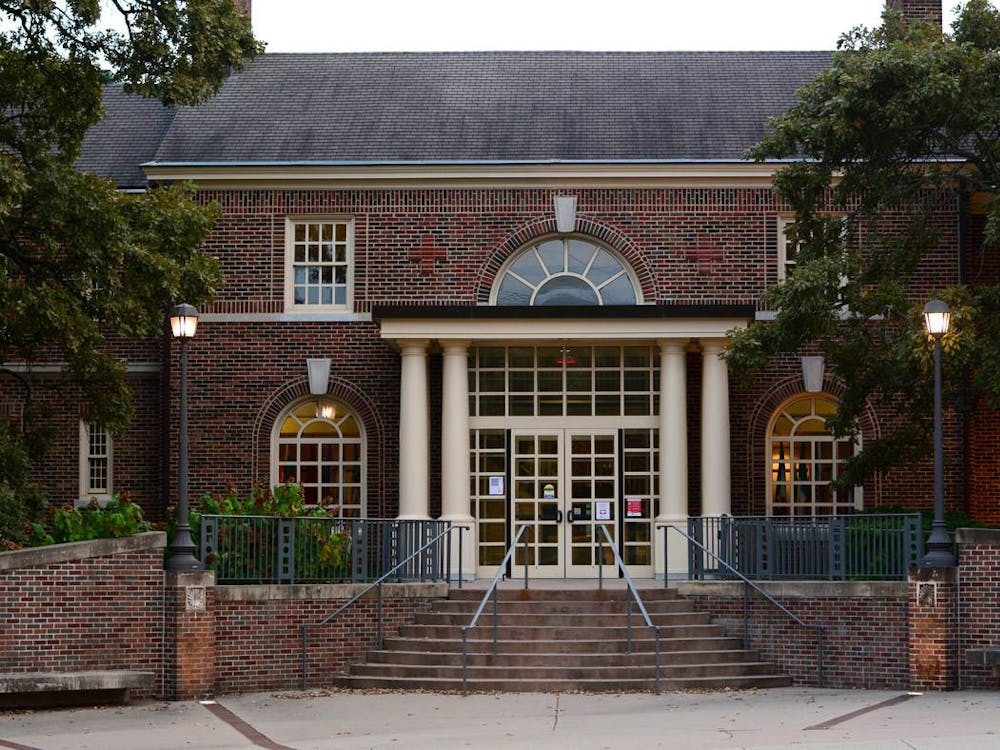Longtime New Yorker contributor and author George Packer visited Miami last Thursday, Feb. 16, to discuss war reporting and present a lecture on the growing class divide in America as well as the importance of the humanities in education.
For the Humanities Center event "War Stories," Packer sat down with Miami journalism professor James Tobin, author of the book "Ernie Pyle's War," a biography of the famous war correspondent, and spoke about Packer's coverage of the Iraq War. As Packer admitted, though, he doesn't consider himself a war correspondent.
"I was a journalist who went to Iraq because it was an enormous part of history," Packer said. "When I first went, we didn't think this was going to be a mass insurgency that lasted years . . . I wanted to know what the Iraqis were going through."
Packer published his book "The Assassin's Gate: America in Iraq" in 2005 after spending time in the country getting to know both sides -- the deployed Americans as well as locals. He said the latter had the biggest influence on him while writing the book, specifically citing a 28-year-old woman he met who had learned English through watching American films and dreamt of leaving Baghdad despite opposition from her family. She now lives in Oklahoma.
"In my work, I write about people that I like," Packer said. "I also don't write about VIPs very much . . . If I wrote about VIPs more, I would probably dislike my subjects more."
The American soldiers he met in Iraq intrigued Packer.
"I became very much distressed with America, but very in love with Americans," he said regarding the time he spent in Iraq.
Packer recalled a moment in which he was stuck on a crowded road in Baghdad. He witnessed an American soldier leap out of his Humvee to help direct traffic, defying the inconsiderate behavior he saw many Americans display while "hurtling" through the streets of Iraq's capital.
"Those are the moments that we do live for," Packer said. "They're unexpected. They can be banal, but something can be revealed."
He likened the divide the Iraqi War generated in the U.S. to that of the 2016 presidential election, remarking that the former had given him a "premonition" of what would happen to the country.
Later Thursday night, Packer presented a lecture titled "History, Literature, and the American Promise," touching on the importance of the humanities and American identity and the threat of "fake news" -- prompting a singular but strident protest from a conservative audience member.
Early in his lecture, Packer declared that American democracy is so divided that the U.S. is in a state of crisis, and that "it comes from within." Packer's latest book, "The Unwinding: An Inner History of the New America," delves into the potential reasons why this crisis has gripped the nation and what we can do to fix it -- for one, emphasizing the importance of humanities in higher education.
Enjoy what you're reading?
Signup for our newsletter
"It's not something I think of as a discipline," Packer said, referring to the arts. "It's a way of life."
Analyzing the causes of the national divide, "The Unwinding" focuses on a wide variety of Americans spread over different social classes and follows their life journeys. Packer cited the working-class people such as those he met in Youngstown, Ohio and small-town North Carolina as the most inspirational forces behind his writing the book and what led him to examine the widening class gap in the country.
"For all their personal failings and their social struggles, they had a kind of resilience and resourcefulness that I found amazing," Packer said. "I don't want to say it's peculiarly American, because you can find it elsewhere, but it's something never to write off, never to count out."
Packer discussed how the nation has become divided into groups valuing vastly different things, and how many working-class Americans feel the country's elites have "betrayed" them and their ideals. This, in turn, has led to widespread distaste for left-leaning values and liberalism.
When Packer criticized the Trump administration, specifically press secretary Sean Spicer, a Miami sweatshirt-clad alumnus in the audience stood and declared, "Bullshit."
He pointed out that whether anyone liked him or not, Trump had won the electoral vote, and accused Packer of not giving the newly instated president a chance.
"This is why there's a crisis, because he won," Packer countered. "If he'd lost, there wouldn't be a crisis."
When the heckling audience member continued, accusing him of spreading his liberal agenda to impressionable students, Packer pointed out that he was not a staunch partisan and had criticized both conservative and liberal politicians in the past. He added that he was simply there to express his opinion, and that all the students present were free to think for themselves.
As for what Miami students can do to help reunify the nation, other than continuing to support hit musical "Hamilton" and other works of all-inclusive, boundary-pushing art like it, Packer urged them to step outside their comfort zones.
"Figure out how to talk to people who don't think like you and who don't come from where you come from," Packer said. "Once you're out of this bubble, go find a bubble that you're not comfortable in and that challenges you, and that forces you to reconsider your own premises and your own background. It may not change anything fundamentally in you, like your values and the way you think, but it would be a great experiment"



